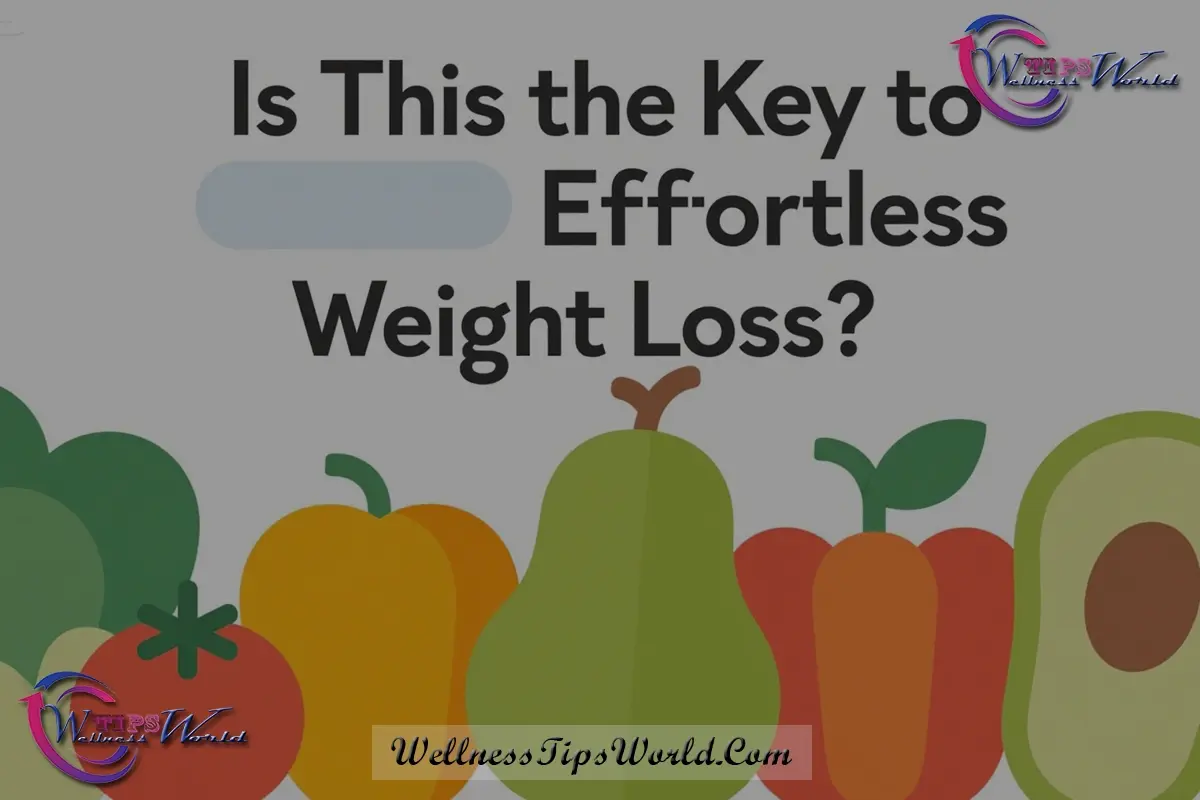Is This the Key to Effortless Weight Loss?
-
22
- 22 Aug, 2025

In today's world, we are constantly bombarded with diet fads, workout programs, and weight loss hacks. But what if there was a simple, sustainable solution that doesn't require extreme measures or endless hours at the gym? Imagine a method to achieve effortless weight loss without feeling deprived or overworked. It might sound too good to be true, but the reality is that there are proven strategies that can help you lose weight effectively and with minimal effort. In this article, we'll dive into the concept of effortless weight loss, explore key strategies, and offer practical tips that could help you finally reach your weight loss goals.
What is Effortless Weight Loss?
Before we dive into how to achieve effortless weight loss, let’s first define what it means. Effortless weight loss doesn’t mean you can eat anything you want and magically lose weight without doing anything. It’s about creating a sustainable lifestyle that naturally supports your weight loss goals. This approach focuses on small, consistent changes that add up over time, rather than drastic, short-term fixes that often lead to frustration and burnout.
The key to effortless weight loss is to integrate habits into your daily routine that support your health and well-being, without requiring constant willpower or a sense of restriction. This might involve adjusting your diet, increasing your physical activity, or managing other factors like stress and sleep. By focusing on long-term, sustainable practices, you can achieve your ideal weight in a way that feels natural and maintainable.
What Will You Learn in This Article?
- The truth behind effortless weight loss and how it differs from traditional weight loss methods
- Simple strategies to promote weight loss with minimal effort
- Why lifestyle changes are more effective than quick-fix diets
- Actionable tips to start incorporating into your daily routine for sustained weight loss
Now, let’s explore the proven strategies that can help you achieve effortless weight loss.
1. Prioritize Mindful Eating
What Is Mindful Eating?
Mindful eating involves paying full attention to the food you're eating, the way it looks, smells, tastes, and how it makes you feel. By slowing down and savoring every bite, you can become more attuned to your body's hunger and fullness cues, which can help you avoid overeating.
How Does It Promote Effortless Weight Loss?
Many of us eat mindlessly, distracted by TV, smartphones, or other activities, leading us to consume more food than we need. By practicing mindful eating, you're more likely to recognize when you're full, preventing overeating and helping with portion control. This simple shift can result in significant reductions in caloric intake without the need for drastic dieting.
Pro Tip: Try to eat without distractions—turn off the TV or put down your phone. Focus on each bite and try to enjoy your food.
2. Optimize Your Sleep Routine
How Sleep Affects Weight Loss
It may come as a surprise, but getting enough quality sleep is one of the most critical factors in effortless weight loss. Research shows that poor sleep can lead to imbalances in hunger hormones like ghrelin and leptin, making you more likely to crave high-calorie foods and overeat.
The Connection Between Sleep and Metabolism
Sleep also plays a crucial role in regulating your metabolism. When you don’t get enough sleep, your body becomes less efficient at burning calories and more likely to store fat. Ensuring you get a full 7-9 hours of quality sleep each night is a key factor in supporting weight loss efforts.
Actionable Tip: Aim for a consistent sleep schedule, avoid caffeine late in the day, and create a calming bedtime routine to improve sleep quality.
3. Easy Ways to Add Physical Activity to Your Daily Routine
Find Movement You Enjoy
Exercise doesn't have to mean hitting the gym for hours at a time. The key to effortless weight loss is finding a form of physical activity you enjoy. Whether it’s a daily walk, dancing, yoga, or a fun sport, incorporating movement into your day helps burn calories and increases your metabolism.
Make It a Habit
The more you move, the more your body adapts, and the easier it becomes. Even small amounts of physical activity, such as walking after meals or taking the stairs, can add up and help you achieve your weight loss goals over time.
Pro Tip: Start with short, manageable bouts of exercise and gradually increase the intensity as you build endurance.
4. Adopt a Balanced and Nutrient-Dense Diet
Focus on Whole Foods
Rather than following the latest fad diet, consider adopting a more balanced approach by focusing on whole, nutrient-dense foods. This consists of a mix of vegetables, fruits, lean proteins, whole grains, and good fats. These foods not only nourish your body but also help you feel fuller for longer, preventing overeating.
Why Whole Foods Work for Weight Loss
Whole foods are typically lower in calories and higher in fiber, which helps regulate blood sugar levels and keeps you satisfied. Processed foods, on the other hand, tend to be calorie-dense and can lead to overeating due to their lack of nutrients.
Pro Tip: Aim to fill half of your plate with vegetables at each meal to keep calories in check while getting the nutrients you need.
5. Stay Hydrated
How Water Supports Weight Loss
Drinking enough water throughout the day is essential for overall health and weight management. Sometimes, our bodies confuse thirst with hunger, leading to unnecessary snacking or overeating. Drinking water before meals can help you feel full and reduce the likelihood of overeating.
The Importance of Hydration
Proper hydration supports your metabolism and ensures that your body can efficiently burn fat. It also promotes healthy digestion and helps flush out toxins.
Actionable Tip: Carry a water bottle with you throughout the day and aim to drink at least 8 cups of water daily.
6. Manage Stress Levels
Stress and Weight Gain
Chronic stress is one of the biggest obstacles to effortless weight loss. When you're stressed, your body releases cortisol, a hormone that increases appetite and encourages fat storage, particularly around the abdominal area.
The Impact of Stress on Eating Habits
Stress often leads to emotional eating, where food becomes a source of comfort rather than nourishment. Managing stress effectively can prevent these emotional eating patterns and support weight loss.
Pro Tip: Try relaxation techniques such as meditation, deep breathing exercises, or yoga to manage stress and reduce cortisol levels.
7. Set Realistic and Achievable Goals
The Importance of Setting S.M.A.R.T. Goals
One of the keys to effortless weight loss is setting achievable and realistic goals. When you set specific, measurable, attainable, relevant, and time-bound (S.M.A.R.T.) goals, you create a clear roadmap to success. Start with small, manageable targets and gradually build momentum as you reach them.
Why Unrealistic Expectations Fail
Many weight loss programs promise quick results, but they often lead to frustration and burnout. Instead of focusing on rapid changes, focus on sustainable habits that you can maintain in the long run.
Actionable Tip: Break down your weight loss goals into smaller, more achievable milestones, and celebrate each success along the way.
Effortless Weight Loss is Within Reach
Achieving your weight loss goals doesn’t have to be complicated or exhausting. By focusing on mindful eating, improving your sleep routine, increasing daily physical activity, and making small but sustainable changes to your diet, you can promote effortless weight loss.
Remember, the key is to create lasting habits that align with your lifestyle, rather than relying on extreme measures or quick fixes. Take small steps each day, and over time, you’ll start seeing real results without the stress or pressure of constant dieting.
Start today and let these simple strategies guide you to a healthier, more sustainable weight loss journey. With the right mindset and consistent effort, effortless weight loss can become a reality.










